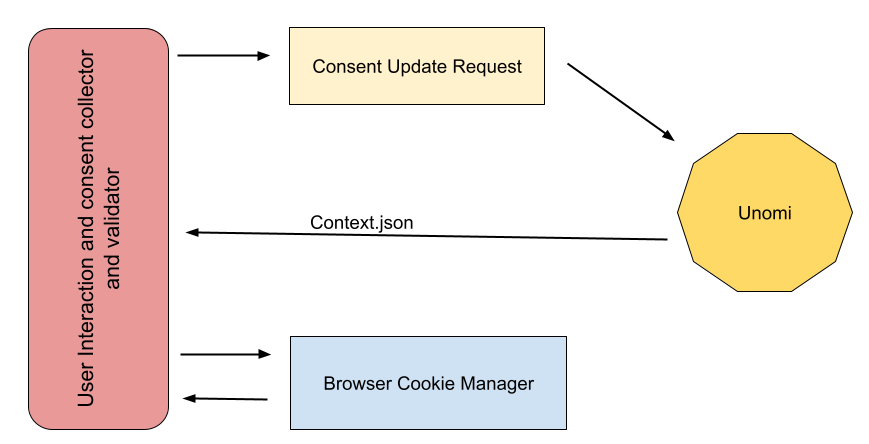Navigating Trust: A Guide to Consent Management with Apache Unomi
In the era of heightened awareness about data privacy and protection, organizations face a critical challenge: gaining and maintaining the trust of their users. Apache Unomi, an open-source customer data platform, comes equipped with robust consent management features, empowering businesses to navigate the complex landscape of user consent effectively. In this blog, we will explore the significance of consent management and how Apache Unomi provides a comprehensive solution.
The Significance of Consent Management
With the advent of stringent data protection regulations such as GDPR (General Data Protection Regulation) and CCPA (California Consumer Privacy Act), organizations are required to obtain explicit consent from users before collecting and processing their personal data. Consent management is the process through which businesses seek, record, and manage user consent, ensuring compliance with regulatory requirements and fostering transparency in data handling practices.
Apache Unomi’s Consent Management Features
1. Granular Consent Collection:
Unomi enables organizations to collect user consent at a granular level. This means businesses can define specific purposes for data processing (e.g., marketing communications, analytics, personalization) and seek user consent for each purpose individually.
2. Consent Storage and Documentation:
The platform maintains a record of user consents, providing a clear and auditable trail of when and how consent was obtained. This documentation is essential for demonstrating compliance with data protection regulations during audits.
3. Consent Expiry and Renewal:
Unomi allows businesses to set expiration dates for user consent. This feature ensures that organizations do not continue processing data without obtaining renewed consent after a specified period. Users are then prompted to review and renew their consent preferences.
4. Preference Centers:
Unomi supports the creation of preference centers where users can easily manage their consent preferences. This empowers users to control the types of data processing they are comfortable with, fostering a sense of transparency and control.
5. Integration with User Profiles:
Consent information is seamlessly integrated into user profiles within Unomi. This integration ensures that businesses have a holistic view of each user, including their consent history and preferences.
6. Real-time Consent Updates:
As users update their consent preferences, Unomi provides real-time updates to ensure that the organization adheres to the most recent user choices. This real-time functionality is crucial for dynamic and responsive consent management.
Benefits of Consent Management with Unomi
1. Legal Compliance:
Unomi’s consent management features assist organizations in complying with data protection regulations, mitigating the risk of legal repercussions. Businesses can build trust with their user base by adopting a proactive approach to compliance.
2. User Trust and Transparency:
Transparent consent management practices enhance user trust. Unomi’s user-friendly preference centers and clear documentation of consent history contribute to a positive user experience and foster a sense of trust in how their data is handled.
3. Risk Mitigation:
Effective consent management is a key element of risk mitigation. Organizations reduce the risk of data breaches and regulatory penalties by clearly documenting and adhering to user consent preferences.
4. Personalization with User Consent:
Unomi enables businesses to deliver personalized experiences while respecting user consent. Organizations can tailor their interactions without compromising privacy by leveraging the data for which users have provided explicit consent.
Use Case 1: Cookie Consent Management
-As per legal compliance, to use a cookie on the web application, user consent is required, to achieve this, web applications can use Unomi’s consent management events and consent block inside the the profile schema. While accessing the page user will be prompted with a block having multiple selections to provide his/her consent to allow all/specific cookies onto the web application.

Use Case 2: Marketing Communications
Consider a scenario where an organization uses Unomi for consent management in the context of marketing communications. Users can provide consent to receive promotional emails, personalized offers, and targeted advertisements. Unomi ensures that only users who have explicitly consented to such communications receive them, thus respecting individual preferences and regulatory requirements.
Conclusion
Consent management is not just a regulatory requirement but a cornerstone of building and maintaining trust in the digital age. Apache Unomi’s comprehensive consent management features empower organizations to navigate the complex landscape of data privacy regulations effectively. By adopting transparent and user-centric consent practices, businesses using Unomi can comply with legal requirements and foster a culture of respect for user privacy, thereby strengthening their relationships with their audience. In the journey towards data responsibility, Unomi emerges as a valuable ally, helping businesses navigate the path to trust and transparency.
Check out our other blog posts for more insights.

